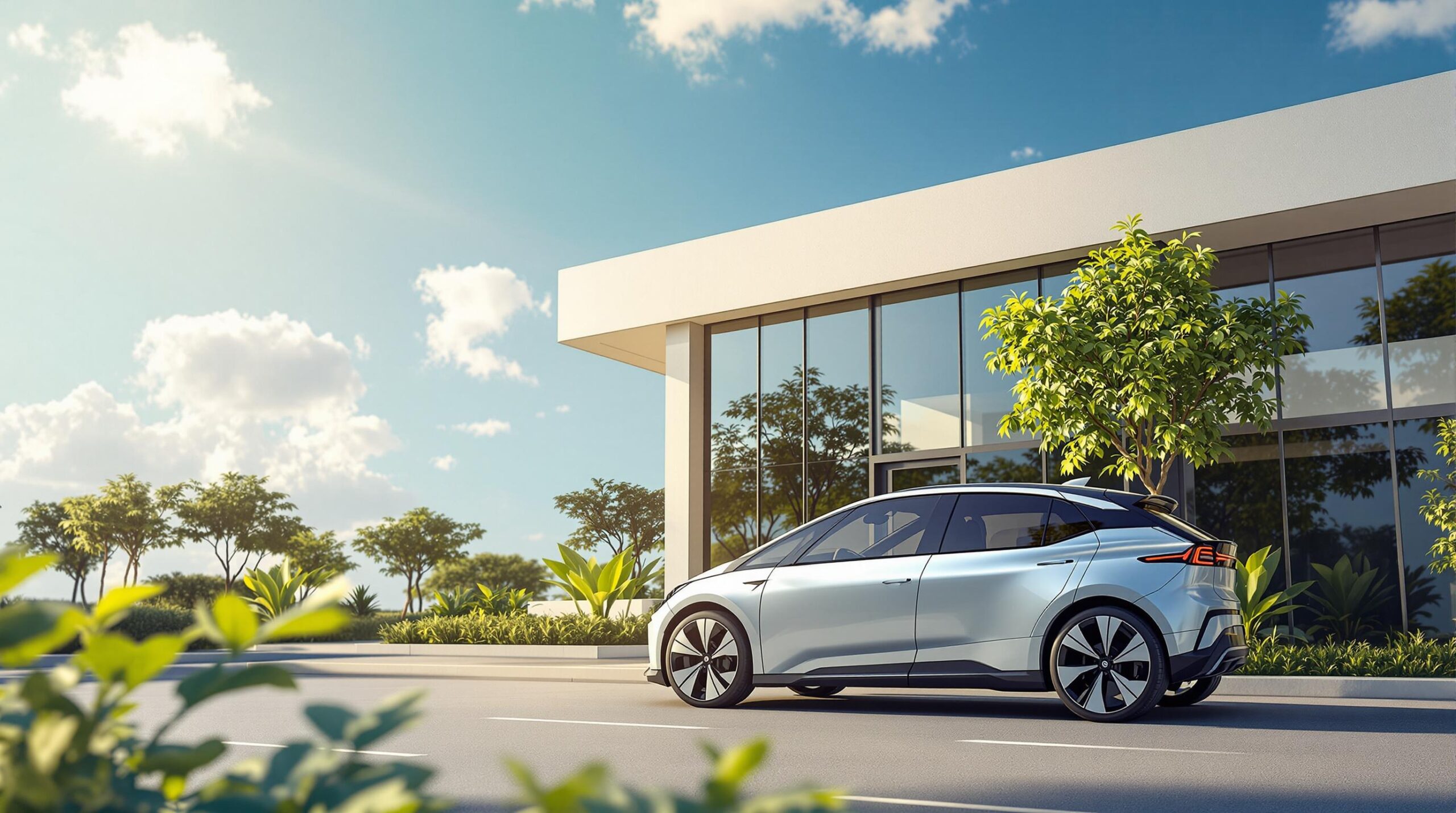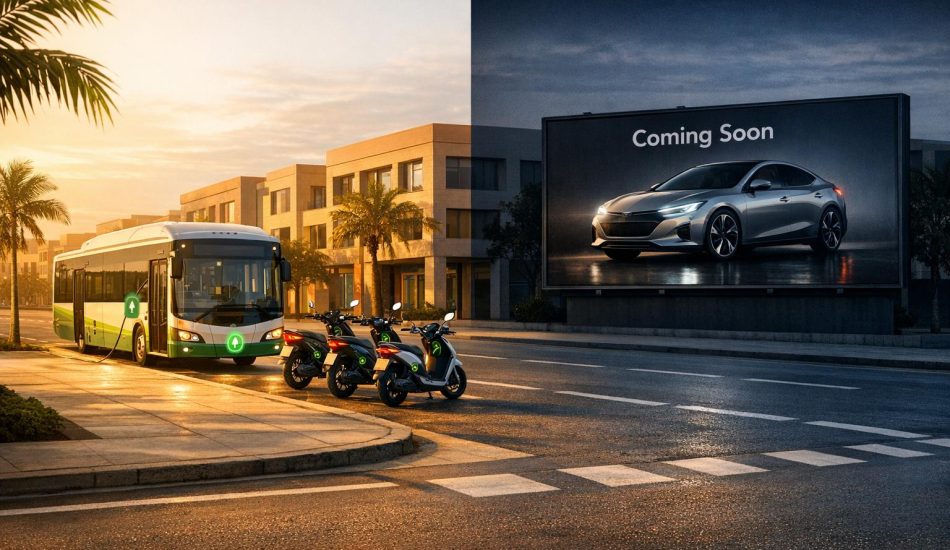
Electric vehicles (EVs) are transforming African businesses by cutting costs, reducing carbon emissions, and driving economic growth. Here’s why EVs are a game-changer:
- Cost Savings: EVs save up to 62% in lifetime costs compared to traditional vehicles, thanks to lower fuel and maintenance expenses.
- Renewable Energy Integration: Pairing EVs with solar power can reduce fleet costs by an extra 19-47%.
- Government Incentives: Countries like South Africa, Zimbabwe, and Nigeria offer tax breaks and subsidies to boost EV adoption.
- Economic Impact: Local EV manufacturing is growing, with assembly plants in 21 countries and markets projected to grow from $15.80B in 2024 to $25.40B by 2029.
- Environmental Impact: Switching to EVs significantly cuts emissions, especially in regions like Kenya where 93% of electricity comes from renewable sources.
From electric buses to motorcycles, African businesses are using EVs to save money, reduce emissions, and build a green brand. The future is electric, and the time to act is now.
Reducing Business Costs with EVs
Fuel and Maintenance Savings
Electric buses are proving to be a cost-effective choice, with a 62% lower lifetime cost compared to traditional internal combustion engine (ICE) buses when charged using the national grid. This cost difference comes from their much higher energy efficiency – gas-powered vehicles use 7.8 times more energy than electric ones.
Maintenance costs also drop with EVs, thanks to their simpler systems and fewer moving parts. These features not only lower repair expenses but also keep vehicles operational for longer. Plus, combining EVs with renewable energy sources can drive expenses down even further.
Solar Power Integration
Solar power can significantly reduce electricity costs. Businesses installing solar photovoltaic (PV) systems can cut energy expenses by 25-50%. This is especially impactful in Sub-Saharan Africa, where businesses often spend over 30% of their energy budget on backup generators, paying around $0.40 per kWh.
"Businesses are penalized twice in terms of electricity, firstly by paying more for the world’s highest electricity costs, and secondly for having to pay for diesel back-up power when the grid is not working." – Terje Osmundsen, Founder and CEO of Empower New Energy
Pairing solar charging with EVs can reduce fleet costs by an extra 19-47% compared to relying on grid charging alone. These combined savings make EV adoption even more attractive, especially with financing options that help businesses manage upfront costs.
| Charging Method | Cost Advantage Over ICE Vehicles |
|---|---|
| Grid Charging | 62% lower lifetime costs |
| Solar + Grid Charging | 81-109% lower lifetime costs |
| Generator Backup Cost | $0.40 per kWh saved |
Payment and Leasing Options
To help businesses overcome the higher initial cost of EVs, a variety of financing options are now available across Africa. These solutions allow companies to spread out the upfront investment while benefiting from lower operating costs right away.
Flexible payment plans, such as lease-to-own agreements and usage-based models, align with business cash flow. These structures make it easier for businesses to adopt EVs and immediately start saving on fuel, maintenance, and energy expenses over time.
Green Business Benefits
Reducing Carbon Emissions
Switching to electric vehicles (EVs) can significantly cut down a business’s carbon emissions. Take Kenya, for example – over 93% of its electricity comes from renewable sources. Using EVs in such markets drastically reduces a company’s environmental impact compared to fossil-fuel vehicles. This shift is particularly important in Africa, which imports 40% of the world’s used fossil-fuel vehicles. Globally, the trend is clear: EVs are expected to make up 22% of vehicle sales by 2025 and 35% by 2030.
Tax Benefits and Subsidies
Governments are rolling out financial incentives to encourage EV adoption. Here’s a snapshot of some key benefits across various countries:
| Country | Tax Benefits & Incentives |
|---|---|
| South Africa | 150% tax deduction on EV production investments starting in 2026 |
| Zimbabwe | Import duty exemption for electrical equipment; 10-year income tax holiday |
| Nigeria | VAT exemption on renewable energy equipment |
| Rwanda | 7-year tax holiday for energy projects with a $50M minimum investment |
| Madagascar | 50% corporate income tax reduction; VAT exemption on equipment |
"We see an interest in many African governments and the private sector in e-mobility today. There is increased interest in more countries to incentivise the uptake of EVs, like Kenya, Ethiopia, Senegal, Côte d’Ivoire and many more where the governments are looking at EV uptake."
– Jane Akumu, Programme Officer, United Nations Environment Programme
Building a Green Brand
Adopting EVs doesn’t just help the environment – it also strengthens your brand. Businesses gain credibility by aligning with environmental goals, meeting new regulations, and staying ahead of competitors. Mauritius offers a great example. After introducing tax incentives in 2019, including a 5–15% reduction in excise duties, the number of hybrid and electric vehicles jumped from just 45 to 14,266 by January 2020.
The advantages are clear:
- Attracting eco-conscious customers
- Complying with evolving regulations
- Creating new revenue streams through charging infrastructure
- Supporting green job creation
The EV market is also growing through initiatives like charging networks and battery swapping.
African Business EV Examples
Company Success Stories
Ampersand is leading the way in Africa’s electric vehicle sector. The company operates 3,000 zero-emission motorcycles across the "boda belt", which stretches from Tanzania to Senegal. Their approach includes a practical battery-swapping system to make electric mobility more accessible.
Ampersand’s partnership with BYD signals ambitious plans for growth. The company aims to produce 40,000 electric motorcycles by the end of 2026, targeting Africa’s massive market of 30 million commercial motorbikes. Other companies are also making strides in transforming urban transportation.
"This partnership marks a major milestone for Ampersand as we continue to lead the charge in providing sustainable, cost-effective, mass-market EV solutions. BYD’s world-leading battery cells and manufacturing scale, combined with Ampersand’s deep customer insight and technical product knowledge, will help fast track the electrification of Africa’s commercial motorcycles. Switching the millions of taxi and delivery two-wheelers to EV energy tech represents one of the world’s best value-for-money decarbonisation opportunities. At the same time, this transformation will save millions of hardworking motorcycle riders six hundred dollars each a year, driving clean economic prosperity."
– Josh Whale, CEO of Ampersand
Another example is BasiGo. Since March 2022, the company has received 450 orders in Nairobi and 40 in Kigali. They collaborate with local manufacturers to assemble electric buses using designs from China.
Business Sector Results
The impact of these initiatives can be seen across various sectors:
| Sector | Key Results |
|---|---|
| Motorcycle Taxis | Daily income increased by 46% (from $2.60 to $3.80) |
| Public Transit | Each electric bus in Nairobi reduces up to 50 tonnes of CO₂ annually |
| Operating Costs | Ampersand drivers cut costs by more than one-third |
In Dakar, a public transportation project launched in January introduced 120 electric buses, serving up to 300,000 passengers daily through a Bus Rapid Transit system.
Individual stories also highlight the benefits. A 49-year-old rider shared, "I used to ride a motorcycle that used gasoline. For that, I paid 6,000 Rwandan Francs ($4.74) every week. Now I save that money because this bike no longer requires oil. That money is now helping me feed my household".
In Kigali, out of 62,000 motorbike drivers, only 40 are women. Impressively, 29 of these women have chosen Ampersand bikes, showing how EV adoption is fostering inclusivity.
"With the innovations in sustainable transport that Ampersand is pioneering, we see a huge potential for improving livelihoods and increasing incomes of those living in poverty",
– Chris Emmott, Acumen’s Associate Director of Investing in Energy Access
sbb-itb-99e19e3
EV Implementation Resources
Charging Station Networks
The rise in electric vehicle (EV) usage has spurred major investments in charging infrastructure. Companies are now rolling out grid-connected and solar-powered charging stations to keep EV fleets running smoothly.
Aeversa has emerged as a major player in this space with its Charging as a Service model. Delsarie van der Merwe from Takealot shared:
"Their robust charging infrastructure, advanced monitoring capabilities, and flexible pricing options have greatly enhanced our EV charging operations."
Eric Parry from Volvo added:
"Aeversa’s expertise in charger installations and nationwide support services has been nothing short of impressive. Their rapid response times and knowledgeable technicians ensure our charging stations operate with the uptime we need for our extra-heavy commercial electric truck fleet."
This strong network is paving the way for further investments in local EV production and fleet management.
African EV Production
EV manufacturing is gaining momentum across Africa, with 21 countries either running or planning production facilities. The market is expected to grow from $15.80 billion in 2024 to $25.40 billion by 2029.
Here are some key highlights:
| Country | Manufacturing Highlights |
|---|---|
| Morocco | Auto industry contributes 22% of GDP, $14 billion in exports, aiming for 60% EV production by 2030 |
| South Africa | Produces over 500,000 vehicles annually, employs 100,000 people, and contributes 5% to GDP |
| Botswana | Leading efforts in battery production facilities |
An Innoson representative summed up the shift, saying, "It just doesn’t make sense to import batteries and major components".
These local production efforts are now supported by advanced fleet management systems that enhance EV operations across the continent.
EV Fleet Management Systems
Fleet management systems are crucial for optimizing EV operations. They offer tools like real-time tracking, predictive maintenance, and performance analytics.
Andre Pretorius from Premier praised Aeversa’s services:
"We have been extremely satisfied with Aeversa’s Service Level Agreement for charger maintenance, on-site training, and monthly reporting. Their attention to detail in maintaining our chargers, comprehensive training programs for our staff, and detailed monthly reports have been instrumental in optimizing our EV vehicles."
Key features of fleet management systems include:
| Component | Function |
|---|---|
| Performance Monitoring | Tracks vehicle efficiency and battery health in real-time |
| Maintenance Scheduling | Predictive maintenance and charger upkeep |
| Training Programs | Provides staff with in-depth EV operation training |
| Analytics Reporting | Delivers monthly performance metrics and insights for optimization |
Elaine Stout from DHL highlighted the benefits of Aeversa’s trial program:
"Aeversa’s Proof of Concept electric vehicle trial offering has proven to be a highly efficient solution, which has not only exceeded our expectations but also highlighted the significant benefits of adopting electric vehicles in our fleet for enhanced productivity and sustainability."
Nigeria Builds the Biggest Electric Vehicle Factory in Africa …
Conclusion
Electric vehicles (EVs) are making a noticeable impact on African businesses by offering a mix of cost savings and cleaner energy solutions. Although the initial costs of EVs can be higher, they lead to lower running expenses and align well with renewable energy sources. For example, in Kenya, over 93% of electricity comes from renewable sources, making EVs an attractive option.
Recent investments highlight the growing interest in this sector:
- Ford: $281 million to boost hybrid vehicle production in South Africa
- Stellantis: $158 million for an electric Jeep manufacturing plant
- Botswana: $26 million allocated to EV battery production
These initiatives, coupled with government policies, are driving change. Public transit systems and motorcycle taxis are already reaping the benefits of these advancements. Governments are also setting ambitious goals – Nigeria plans for 30% EV adoption by 2025, while South Africa is aiming for 20% hybrid light-duty passenger vehicles by 2030.




